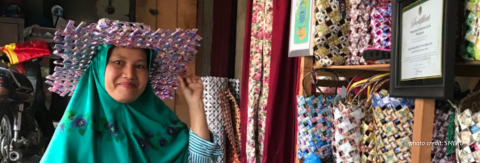This study examines whether internet usage among micro and small enterprises (MSEs) could influence household membersʼ use of the internet in terms of intensity as well as usage for productive activities. Using longitudinal data from MSEs in Yogyakarta, Indonesia, covering the period before and during the COVID-19 pandemic, the study finds that more intensive use of the internet by female entrepreneurs is positively associated with at least an 8 percentage-point higher probability of internet use for school-related purposes by household members. Findings from qualitative analysis indicate that female entrepreneurs who are intensive users of the internet are more effective in persuading their household members to accept use of the internet especially for purposes related to their domain of responsibilities, such as childrenʼs education. We argue that policymakers should focus on improving digital literacy among female entrepreneurs as an affirmative action policy to ensure they can enjoy the maximum benefits that digitalisation has to offer.




